人教版九年级英语1-14单元知识点总结
Units+1-14+单元短语总结2023-2024学年人教版英语九年级全册
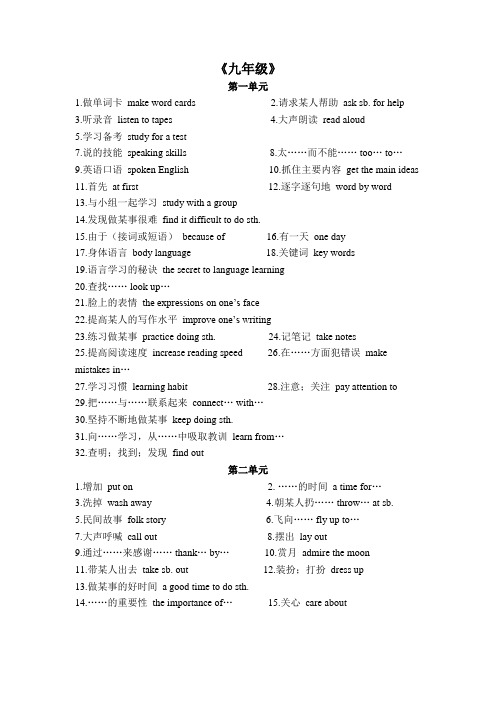
《九年级》第一单元1.做单词卡make word cards2.请求某人帮助ask sb. for help3.听录音listen to tapes4.大声朗读read aloud5.学习备考study for a test7.说的技能speaking skills 8.太……而不能…… too… to…9.英语口语spoken English 10.抓住主要内容get the main ideas 11.首先at first 12.逐字逐句地word by word13.与小组一起学习study with a group14.发现做某事很难find it difficult to do sth.15.由于(接词或短语)because of 16.有一天one day17.身体语言body language 18.关键词key words19.语言学习的秘诀the secret to language learning20.查找…… look up…21.脸上的表情the expressions on one’s face22.提高某人的写作水平improve one’s writing23.练习做某事practice doing sth. 24.记笔记take notes25.提高阅读速度increase reading speed 26.在……方面犯错误make mistakes in…27.学习习惯learning habit 28.注意;关注pay attention to29.把……与……联系起来connect… with…30.坚持不断地做某事keep doing sth.31.向……学习,从……中吸取教训learn from…32.查明;找到;发现find out第二单元1.增加put on2.……的时间a time for…3.洗掉wash away4.朝某人扔…… throw… at sb.5.民间故事folk story6.飞向…… fly up to…7.大声呼喊call out 8.摆出lay out9.通过……来感谢…… thank… by… 10.赏月admire the moon11.带某人出去take sb. out 12.装扮;打扮dress up13.做某事的好时间a good time to do sth.14.……的重要性the importance of…15.关心care about16.过去常常used to 17.以……结束;最终成为…… end up…18.使某人想起某事remind sb. of sth. 19.决定做某事decide to do sth. 20.在危难中;在危急中in need 21.用……对待某人treat sb. with…第三单元1.看起来很可怕look pretty scary2.加油,来吧come on3.起先at first4.路过,经过pass by5.在门口at the door6.寄信mail a letter7.附近的一家餐馆a nearby restaurant 8.一个吃饭的好地方a good place to eat in9.礼貌地求助ask for help politely 10.一个很直接的问题a very direct question11.在不同的场合in different situations 12.引入lead in13.花费时间做某事spend time doing sth.第四单元1.在课堂上in class2.在游泳队on the swim team3.时常,有时from time to time4.全校the whole school5.开始从事take up6.大量的,很多的tons of7.太多的注意too much attention 8.对……小心be careful about…9.私人时间private time 10.成功之路the road to success 11.继续战斗fight on 12.做到最好make it to the top 13.搬进,迁进move in 14.为某人带来麻烦cause problems for sb.15.决定做某事make a decision to do sth.16.一家寄宿学校a boarding school 17.违反规则break the rules18.亲自in person 19.注意…… pay attention to…20.自我感觉良好feel good about oneself21.在过去的几年里in the last few years 22.保沉持沉默remain silent23.大多数时候most of the time 24.缺课be absent from class第五单元1.因……而著名be famous for…2.在过去in the past3.亲手,手工by hand4.即使,尽管even though5.日常用品everyday things6.高科技产品high-technology products7.生长在…… be grown in…8.交通事故traffic accidents9.去度假go on a vacation 10.在山的侧面on the sides of mountains11.在每月的最后一个星期五on the last Friday of each month12.传统的艺术形式forms of traditional art13.被转化为…… be turned into…14.升到空中rise into the air15. ……的象征the symbols of…第六单元1.一项意外的发明an accidental invention4.发生,出现take place5.毫无疑问,的确without doubt6.茶的普及the popularity of tea7.受众人喜爱的活跃的运动a much-loved and active sport8.把……划分成divide… into 9.……的数目the number of…10.阻止某人做某事stop sb. from doing sth.11.不但……而且…… not only… but also12.钦佩,仰慕look up to第七单元1.被允许做…… be allowed to do sth.2.停止做某事stop doing sth.3.需要时间做某事need time to do sth.4.拍照take photos5.整晚all night6.待在某人的身边stay by one’s side7.使某人远离危险keep sb. from danger 8.回忆起过去think back to those times9.回嘴,顶嘴talk back 10.对做过的事情遗憾/后悔regret doing sth.11.社会工作social work 12.远离…… keep away from…13.给某人一个机会做某事give sb. a chance to do sth.14.通过考试pass a test 15.做自己的决定make one’s own decision16.考试不及格fail a test 17.对某人要求严格be strict with sb.18.参加考试take a test 19.挡……的路;妨碍get in the way of20.担心,关心worry about 21.对……认真be serious about…22.不反对做某事have nothing against sth.23.练习做某事practice doing sth.第八单元1.属于belong to2.彼此认识know each other3.窗户外面outside the window4.隔壁邻居next-door neighbor5.感觉心神不宁feel uneasy6.走开,走掉go away7.在我们的居民区in our neighborhood 8.做某事很开have fun doing sth.9.历史古迹historical place 10.和某人交流communicate with sb.11.按某种方式in a certain way12.在很长一段时间内over a long period of time13.在一个仲夏的早晨on a midsummer’s morning14.预防疾病prevent illness 15.看日出see the sun rising第九单元1.既然那样in that case2.空闲时间spare time3.圆满的结局a happy ending4.解决问题solve the problem5.关闭,停止运转shut off6.偶尔地,间或once in a while7.想要做某事feel like doing sth.8.随……哭cry along with…9.因……而著名be known for…第十单元1.握手shake hands2.首次,第一次for the first time3.应当做某事be supposed to do sth.4.伸出hold out5.以错误的方式问候某人greet sb. the wrong way6.犯错误make mistakes7.拜访drop by one’s home8.毕竟after all 9.对某事随意/不严格be relaxed about10.在我们的日常生活中in our everyday lives11.大动肝火,气愤get mad 12.努力做某事make an effort to do sth.13.把……擦掉clean… off 14.用……指向某人point at sb. with…15.习惯于做某事be/get used to doing sth.16.舒服地做某事be comfortable doing sth.17.特别、格外努力go out of one’s way18.使某人感到宾至如归make sb. feel at home19.给某人一些建议give sb. some suggestions20.在餐桌旁at the table 21.旅途平安have a safe trip22.期待做某事,盼望做某事look forward to doing sth.23.出席,到场show up 24.值得做某事be worth doing sth.25.敲门knock on the door第十一单元1.使人不舒服make sb. uncomfortable2.使某人生气make sb. angry3.宁愿做某事would rather do sth.4.使某人发疯drive sb. crazy5.成为某人的朋友be friends with sb.6.被遗忘,被忽略be left out7.有许多共同点have a lot in common 8.很久以前a long time ago9.无缘无故地哭cry for no reason 10.既不……也不…… neither…nor…11.取代某人的位置take one’s position 12.使某人紧张不安make sb. nervous13.想要做某事feel like doing sth. 14.归还hand back15.仍然不高兴remain unhappy 16.被别人跟随be followed by others17.拥有很多的财富have a lot of wealth 18.注视,监视……keep one’s eye s on…19.使……失望let… down 20.输掉比赛lose the game21.辜负了球队fail the team 22.穿过…… walk through…23.从……中吸取教训learn from…24.严格要求某人be hard on sb. 25.并非,而不是rather than 26.齐心协力,通力合作pull together第十二单元1.到……时候by the time…2.开始洗澡get in the shower3.把……落在家里leave sth. at home4.洗完澡get out of the shower5.一路跑到…… run all the way to…6.难怪…… no wonder…7.捎某人一程give sb. a lift 8.发生,进行go on9.凝视,关注stare at 10.疑惑地,怀疑地in disbelief 11.暗自想,自思自忖think to oneself 12.变成,成为turn into13.径直走向…… go straight to…14.奔出,冲出rush out15.一夜未睡,整晚熬夜stay up all night 16.发生,举行take place17.捉弄某人play a trick on sb. 18.对某人开玩笑play a joke on sb.。
人教版九年级英语上册各单元知识点汇总

人教版九年级英语上册各单元知识点汇总UNIT1 How can we become good learners?SectionA重点单词听,并跟读下列单词l. textbook n.教科书;课本2. conversation n.交谈;谈话3. aloud adv.大声地;出声地4. pronunciation n.发音;读音5. sentence n.句子6. patient adj.有耐心的n.病人7. expression n.表情;表示;表达方式8. discover v.发现;发觉9. secret n.秘密;秘诀adj.秘密的;保密的10. grammar n.语法l1. repeat v.重复;重做l2. note n.笔记;记录v.注意;指出13. pal n.朋友;伙伴14. chemistry n.化学15. memorize v.记忆;记住16. pattern n.模式;方式听,并跟读下列单词变形。
l. conversation —converse (v.会话)2. patient —patience (n.耐心)3. expression —express (v.表达)1. discover —discovery ( n.发现)5. improve —improvement( n.改善)重点短语听,并跟读下列短语。
l. make word cards 制作单词卡片2. ask sb. for ... 向某人寻求……3. have conversations with sb. 和某人谈话4. at first 起初, 起先5. give a report 做报告6. take notes 记/做笔记7. word by word 逐词地8. so... that 如此……以至于9. write e-mails to sb. 给某人写电子邮件10. be afraid to do sth. /be afraid of doing sth.害怕做某事11. because of 由于;因为12. fall in love with 爱上13. a piece of cake 小菜一碟14. look up( 在词典、参考书中或通过电脑)查阅;抬头看15. so that 以便重点句型听,并跟读下列句子。
人教版九年级英语上册各单元知识点归纳总结
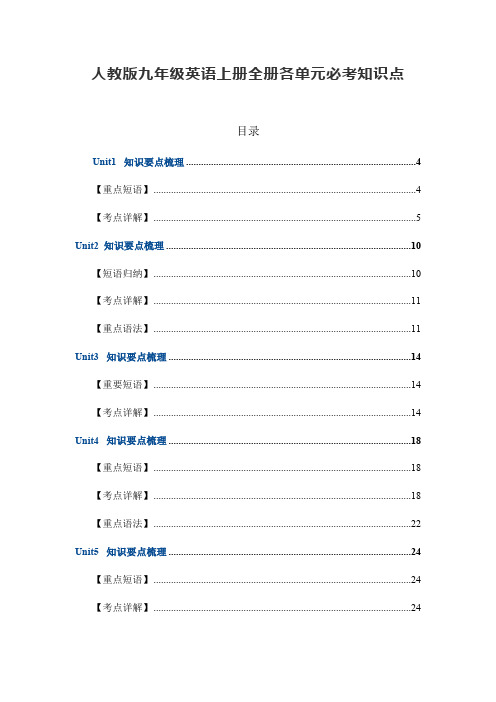
人教版九年级英语上册全册各单元必考知识点目录Unit1 知识要点梳理 (4)【重点短语】 (4)【考点详解】 (5)Unit2 知识要点梳理 (10)【短语归纳】 (10)【考点详解】 (11)【重点语法】 (11)Unit3 知识要点梳理 (14)【重要短语】 (14)【考点详解】 (14)Unit4 知识要点梳理 (18)【重点短语】 (18)【考点详解】 (18)【重点语法】 (22)Unit5 知识要点梳理 (24)【重点短语】 (24)【考点详解】 (24)【重点语法】 (27)Unit6 知识要点梳理 (30)【重点短语】 (30)【考点详解】 (30)【重点语法】 (33)Unit1 知识要点梳理【重点短语】1. have conversation with sb. 同某人谈话2. too…to… 太……而不能3. the secret to… ……的秘诀4. be afraid of doing sth./ be afraid to do sth. 害怕做某事5. look up 查阅6. repeat out loud 大声跟读7. make mistakes in 在……方面犯错误8. connect ……with… 把……和……连接/联系起来9. get bored 感到厌烦10. be stressed out 焦虑不安的11. pay attention to 注意;关注12. depend on 取决于;依靠13. the ability to do sth.. 做某事的能力【考点详解】1. by + doing 通过……方式(by是介词,后面要跟动名词,也就是动词的ing 形式)2. talk about 谈论,议论,讨论The students often talk about movie after class. 学生们常常在课后讨论电影。
talk to sb= talk with sb 与某人说话3. 提建议的句子:①What/ how about +doing sth.? 做…怎么样?(about后面要用动词的ing形式,这一点考试考的比较多)如:What/ How about going shopping?②Why don't you + do sth.? 你为什么不做…?如:Why don't you go shopping?③Why not + do sth. ? 为什么不做…?如:Why not go shopping?④Let's + do sth. 让我们做…...吧。
人教版九年级全一册英语Unit1单元语法知识点总结
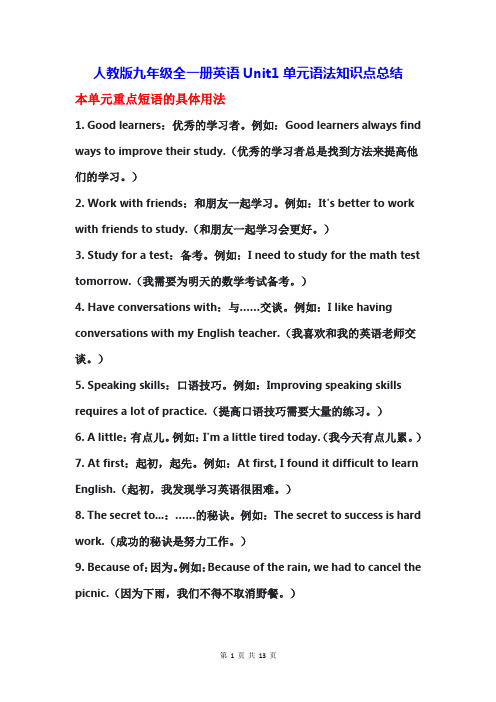
人教版九年级全一册英语Unit1单元语法知识点总结本单元重点短语的具体用法1. Good learners:优秀的学习者。
例如:Good learners always find ways to improve their study.(优秀的学习者总是找到方法来提高他们的学习。
)2. Work with friends:和朋友一起学习。
例如:It's better to work with friends to study.(和朋友一起学习会更好。
)3. Study for a test:备考。
例如:I need to study for the math test tomorrow.(我需要为明天的数学考试备考。
)4. Have conversations with:与……交谈。
例如:I like having conversations with my English teacher.(我喜欢和我的英语老师交谈。
)5. Speaking skills:口语技巧。
例如:Improving speaking skills requires a lot of practice.(提高口语技巧需要大量的练习。
)6. A little:有点儿。
例如:I'm a little tired today.(我今天有点儿累。
)7. At first:起初,起先。
例如:At first, I found it difficult to learn English.(起初,我发现学习英语很困难。
)8. The secret to...:……的秘诀。
例如:The secret to success is hard work.(成功的秘诀是努力工作。
)9. Because of:因为。
例如:Because of the rain, we had to cancel the picnic.(因为下雨,我们不得不取消野餐。
人教版中考英语一轮复习:九年级英语Unit1-Unit 14 各单元重点语法知识点复习提纲(全面!)

人教版九年级全一册英语Unit 1 -Unit 14 各单元重点语法知识点复习提纲Unit 1 How can we become good learners?一、【精选单词】:ability n.能力;才能, attention注意;关注, brain大脑,conversation n. 交谈;谈话, expression n.表达(方式);表示, grammar n.语法,knowledge n.知识;学问, note n.笔记;记录, pronunciation n.发音;读音,secret n. 秘密;秘诀adj. 秘密的;保密的, speed n. 速度, textbook n. 教科书;课本,connect v.(使)连接;与⋯⋯有联系, create创造, discover v. 发现;发觉, increase v. 增加;增长,pronounce v.发音, repeat v.重复;重做, review v. & n. 回顾;复习,active adj. 活跃的;积极的, patient adj.有耐心的n.病人,二、【词组短语】1.become good learners .成为好的学习者2.work with friends .和朋友一块工作3.make word cards .做单词卡4.read the textbook .读课本5.listen to tapes .听磁带6.ask the teacher for help6.找老师帮忙7.study for a test .备考8.work with a groups.小组学习9.watch videos .看录像10.have conversations with sb.10.和某人交谈11.read aloud 大声读12.practce pronunciation12.练习发音13.learn a lot .学到许多14.improve my reading skills .提高我的阅读技能15.too hard to understand 太难理解16.spoken English英语口语17.a little nervous有点紧张18.finish reading读完19.give a report作报告20.get the main ideas理解大意21.word by word 逐词22.read word groups读词组23.guess a word's meaning猜词意24.be patient with sb.对...有耐心25.the more you read, the faster you'll be.你读的越多,你读的就越快26.find it difficult to learn 发现学习难27.the secret to language learning 语言学习的秘诀28.learn to do sth 学会做某事29.so……that如此……以至于30.most of the time 大部分时间31.be afraid to do 害怕32.because of my poor pronunciation因为我发音不好33.hide behind my textbook藏在我的课本后34.fall in love with 爱上35.begin to do 开始做36.body language.肢体语言37.expressions on their faces.面部表情38.listen for just the key words只留心听关键词39.as well as和...一样好/也40.something interesting一些有趣的东西eful sentences有用的句子42.a piece of cake小菜一碟/很容易的事情43.it serves you right.活该44.look them up查询他们45.so that以便46.have a better understanding of对...有一个更好的理解47.repeat out loud大声重复出来48.take notes记笔记49.do grammar exercises做语法练习50.keep a diary in English用英语记日记51.increase my reading speed提高我的阅读速度52.make mistakes in grammar/spelling在语法/拼写方面犯错53.get the pronunciation right把发音弄准确54.get much writing practice进行许多书写练习55.have a partner to practice English with找个一块练英语的伙伴56.a successful learner 一个成功的学习者57.be born with 与生俱来/天生具有58.the ability to learn 学习能力59.whether or not 不管还是60.depend on依靠61.learning habits学习习惯62.have ... in common 在...有共性63.creat an interest in sth.在.....创造兴趣64.be interested in感兴趣65.pay attention to关心,注意66.connect ...with把... 和...相连接67.get bored厌烦68.learn from mistakes从错误中学习.69.think about 考虑70.be good at擅长71.even if即使72.practice makes perfect熟能生巧73.keep practicing坚持练习74.develop their study skills培养他们的学习技巧75.it is not enough to do sth干……还不够76.write down写下77.draw mind maps画思维导图78.look for ways to do寻找做……的办法79.explain sth to sb.向某人解释……80.ask each other相互问81.find out the answers找到答案82.knowledge comes from questioning.知识来源于质疑83.a lifelong journey.一生的旅行84.learn wisely.智慧地学习?85.three good ways to .三个做……好办法86.be stressed out紧张的87.develop smart study skills.培养聪明的学习技巧88.on one's own.某人亲自89.bit by bit.一点一点的/逐渐地90.the last minute to do.做……的最后时刻91.at once.立刻,马上92.prepare well for sth准备好93.worry about.担心94.over and over again一次就一次地95.have a listening test.进行一次听力考试三、【重点句型】1. What about listening to tapes?听磁带怎么样?2. How do you study for a test?你怎样为考试而学习的?3. I study by making word cards.我通过制作单词卡片来学习。
九年级英语全一册(1-14单元)知识点归纳

新人教版九年级英语全册知识点归纳及习题(最新)Unit 1 How can we become good learners?一、短语总结:1. good learners 优秀的学习者2. work with friends 和朋友一起学习3. study for a test 备考4.have conversations with 与……交谈5.speaking skills 口语技巧6.a little 有点儿7.at first 起初;起先8.the secret to......,.......的秘诀9.because of 因为10.as well 也11.look up (在词典中等)查阅;抬头看12.so that 以便,为了13.the meaning of ……的意思14.make mistakes 犯错误15.talk to 交谈16.depend on 依靠;依赖17.in common 共有的18.pay attention to 注意;关注19.connect ……with ……把……联系。
20.for example 例如21.think about 考虑22.even if 即使;尽管;纵容23.look for 寻找24.worry about 担心担忧25.make word cards 制作单词卡片26.ask the teacher for help 向老师求助27.read aloud 大声读28.spoken English 英语口语29.give a report 作报告30.word by word 一字一字地31.so……that 如此……以至于32.fall in love with 爱上33.something interesting 有趣的事情34.take notes 记笔记35.how often 多久一次36.a lot of 许多37.the ability to do sth. 做某事的能力38.learning habits 学习习惯39.be interested in 对……感兴趣40.get bored 感到无聊41.be good at 在……方面擅长42.be afraid of 害怕43.each other 彼此互相44.instead of 代替而不是二.用法集萃1. by doing sth. 通过做某事2.it +be+adj.+to do sth. 做某事是……的3.finish doing sth. 完成某事4.what about doing sth.?做某事怎么样?5.try to do sth. 尽力做某事6.the +比较级,the+比较级越……,就越……7.find it+adj.+to do sth. 发现做某事8.be afraid of doing sth. 害怕做某事9.help sb. (to) do sth. 帮助某人做某事10.practice doing sth. 练习做某事11.keep doing sth. 一直做某事12.be afraid to do sth. 害怕做某事13.begin to do sth. 开始做某事14.want to do sth. 想要做某事15.need to do sth. 需要做某事16.remember to do sth. 记得做某事17.shoot 射(射着,射死等表结果)18.shoot at(瞄准)射Unit1 检测题一.单项选择1.—_______ do you study English? —By listening to tapes.A. HowB. WhereC. WhenD. Why2.You can improve your English practicing more. A.by B.with C.of D.in3. Why not practice your _________English in _________ English-speaking country?A. speaking, aB. speaking, anC. spoken, an4. ______conversations with others is one of the secrets to _____a successful learner.A. Practice, becomeB. Practice, becomingC. Practicing, becoming5 ---There’re a few new words in the article? ---What about _________in your dictionary? A. looking it up B. looking up it C. looking them up6. We’ll go out to play ______ it rains tomorrow. A. so B. unless C. because7. Can you __which is the right answer to the question? A. look for B. find C. find out8. Jenny used to be afraid to ________in class, so she always ________nothing.A. speak, talkedB. speak, saidC. say, spoke9.— Why not listen to BBC news to improve your listening skills?—It’s ______ difficult _____ I can’t follow. A. too; to B. so; that C. such; that10. A good learner often thinks about ________he needs to practice more.A. thatB. whatC. how11.--I’m g oing to listen ____the tape. --OK. Remember to listen ____the key words.A. to, toB. to ,forC. for, to12. ________or not you can learn well depends on your learning habits.A. IfB. WeatherC. Whether13. I have finished _________my report. May I start to learn ________the guitar?A. writing, playingB. writing, to playC. to write, playing14. ---I often make mistakes ____grammar. ---Why not ask your teacher ____help?A. in, toB. in, forC. at, to15. _________write down the new words in your notebook?A. Would you likeB. How aboutC. Could you please16. ---Jack used to have ____writing practice. ---Yes, and he had learned ______.A. a lot of, a lot ofB. a lot of, a lotC. a lot, a lot of17. The more careful you are, ________mistakes you’ll make.A. fewerB. the fewerC. the less18. G ood learners aren’t afraid _____mistakes. Instead, they learn ________mistakes.A. of making, inB. to make, fromC. to make, in19. For the first time, pay attention _________quickly to get the main ideas.A. to readB. readingC. to reading20.I discovered that listening to is the secret language learning.A. something interesting, toB. interesting something, toC. something interested, ofD. interested something of21.Jenny found it very easy English well.A. learningB. to learnC. learnD. learned22. He_____ with the girl with golden hair and will soon get married____ her.A. falls in love; toB. is in love; toC. loves; withD. loves; to23. My father thinks _____ is a great way to learn English.A. study grammar.B. I study grammar.C. studying grammar.D. studies grammar24 Why not ___ your teacher for help when you can’t finish _____ it by yourself?A. ask; writeB. to ask; writingC. ask; writingD. asking; write25. — I wonder if I can learn English well.—. All things are difficult before they are easy.A. I am afraid soB. You’re slowC. It takes timeD. It’s a piece of cake26 You’ll find _____________ easy to learn it well. A. that B. its C. it D. this27. –I don’t have a partner to practice English ______________.---Why not join an English language club to practice _______________?A. /; speakingB. with; to speakC. /; to speakD. with; speaking28. ---She hardly makes mistakes _________English grammar.---No, it seems that she was born ________the ability to learn languages.A. in, withB. with, inC. in, inD. with, with二用所给单词的适当形式填空。
人教版九年级英语各单元难点概括
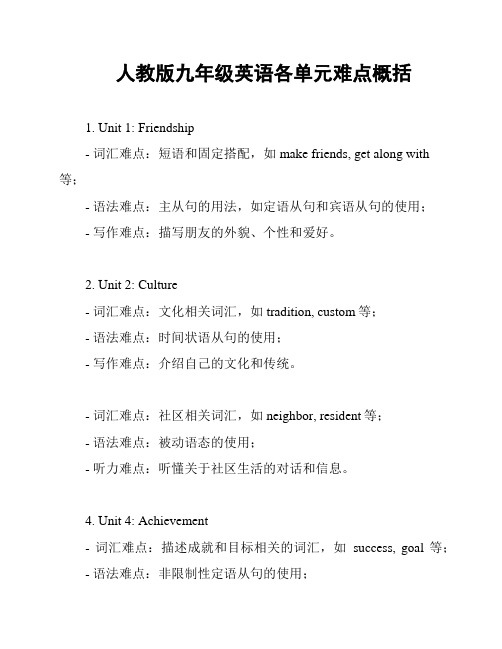
人教版九年级英语各单元难点概括1. Unit 1: Friendship- 词汇难点:短语和固定搭配,如make friends, get along with 等;- 语法难点:主从句的用法,如定语从句和宾语从句的使用;- 写作难点:描写朋友的外貌、个性和爱好。
2. Unit 2: Culture- 词汇难点:文化相关词汇,如tradition, custom等;- 语法难点:时间状语从句的使用;- 写作难点:介绍自己的文化和传统。
- 词汇难点:社区相关词汇,如neighbor, resident等;- 语法难点:被动语态的使用;- 听力难点:听懂关于社区生活的对话和信息。
4. Unit 4: Achievement- 词汇难点:描述成就和目标相关的词汇,如success, goal等;- 语法难点:非限制性定语从句的使用;- 阅读难点:理解关于成功人士的文章和资料。
5. Unit 5: Environment- 词汇难点:环境保护相关词汇,如pollution, recycling等;- 语法难点:情态动词的使用;- 写作难点:写一篇关于环境保护的文章。
6. Unit 6: Entertainment- 词汇难点:与娱乐相关的词汇,如concert, performance等;- 语法难点:直接引语和间接引语的转换;- 听力难点:听懂有关娱乐活动的对话和信息。
7. Unit 7: Technology- 语法难点:虚拟语气的使用;- 阅读难点:理解关于科技发展的文章和报告。
8. Unit 8: Health- 词汇难点:与健康相关的词汇,如exercise, diet等;- 语法难点:情态动词和情态动词的一般疑问句;- 听力难点:听懂与健康生活方式相关的对话和广播。
9. Unit 9: Future- 词汇难点:与未来相关的词汇,如dream, plan等;- 语法难点:虚拟语气的运用;- 写作难点:描述自己的未来计划。
人教版九年级英语全册各单元知识点总结
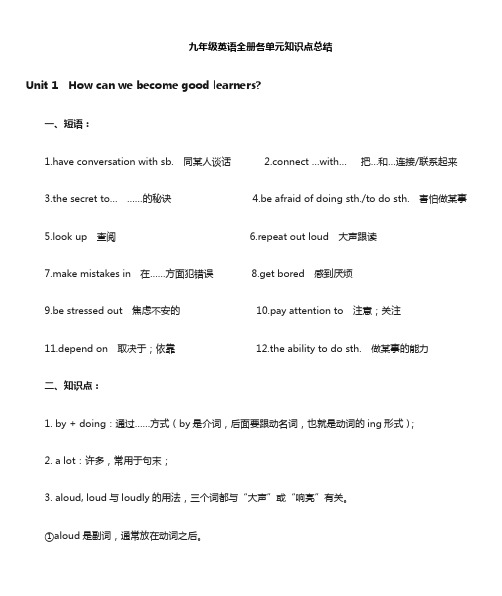
九年级英语全册各单元知识点总结Unit 1 How can we become good learners?一、短语:1.have conversation with sb. 同某人谈话2.connect …with… 把…和…连接/联系起来3.the secret to… ……的秘诀4.be afraid of doing sth./to do sth. 害怕做某事5.look up 查阅6.repeat out loud 大声跟读7.make mistakes in 在……方面犯错误8.get bored 感到厌烦9.be stressed out 焦虑不安的10.pay attention to 注意;关注11.depend on 取决于;依靠12.the ability to do sth. 做某事的能力二、知识点:1. by + doing:通过……方式(by是介词,后面要跟动名词,也就是动词的ing形式);2. a lot:许多,常用于句末;3. aloud, loud与loudly的用法,三个词都与“大声”或“响亮”有关。
①aloud是副词,通常放在动词之后。
②loud可作形容词或副词。
用作副词时,常与speak, talk, laugh等动词连用,多用于比较级,须放在动词之后。
③loudly是副词,与loud同义,有时两者可替换使用,可位于动词之前或之后。
4. not …at all:一点也不,根本不,not经常可以和助动词结合在一起,at all 则放在句尾;5. be / get excited about sth.:对…感到兴奋;6. end up doing sth:终止/结束做某事;end up with sth.:以…结束;7. first of all:首先(这个短语可用在作文中,使得文章有层次);8. make mistakes:犯错make a mistake 犯一个错误;9. laugh at sb.:笑话;取笑(某人)(常见短语)10. take notes:做笔记/记录;11. native speaker 说本国语的人;12. make up:组成、构成;13. deal with:处理、应付;14. perhaps = maybe:也许;15. go by:(时间)过去;16.each other:彼此;17.regard… as … :把…看作为…;18.change… into…:将…变为…;19. with the help of sb. = with one's help 在某人的帮助下(注意介词of和with,容易出题)20. compare … to …:把…比作… compare with 拿…和…作比较;21. instead:代替,用在句末,副词;instead of sth / doing sth:代替,而不是(这个地方考的较多的就是instead of doing sth,也就是说如果of后面跟动词时,要用动名词形式,也就是动词的ing形式)22.Shall we/ I + do sth.? 我们/我…好吗?23. too…to:太…而不能,常用的句型是too+形容词/副词+ to do sth.Unit 2 I think that moon cakes are delicious!一、短语:1. the Lantern Festival 元宵节2. the Dragon Boat Festival 端午节3. the Water Festival 泼水节4. remind sb. of 使某人想起5. eat five meals a day 一天吃五餐6. put on five pounds 体重增加了五磅7. treat sb. with. 用/以……对待某人8. be similar to... 与.......相似9. end up 最终成为/处于10. share sth. with sb. 与……分享……11. as a result结果12. one... the other... (两者中的) 一个…另一个…13. take sb. out for dinner 带某人出去吃饭14. dress up 乔装打扮15. haunted house 鬼屋16. the beginning of new life 新生命的开始二、知识点:1.宾语从句:(三大考点:引导词、时态和语序。
人教版九年级英语1-14单元单词默写

九年级上1-14单元单词默写Unit l1.教科书;课本2.交谈;谈话3.大声地;出声地4.发音;读音5.句子6.病人7.表达(方式);表示8.发现;发觉9.秘密;秘诀adj. 秘密的;保密的10.爱上;与⋯⋯相爱11.语法12.重复;重做13.笔记;记录v. 注意;指出14.朋友;伙伴15.模式;方式16.物理;物理学17.化学18.搭档;同伴19.发音20.增加;增长21.速度22.能力;才能23.大脑24.活跃的;积极的25.注意;关注26.注意;关注27.(使)连接;与⋯⋯有联系28.把⋯⋯和⋯⋯连接或联系起来29.一夜之间;在夜间30.回顾;复习31.知识;学问32.明智地;聪明地Unit233.灯笼34.陌生人35.亲属;亲戚36.增加(体重);发胖37.磅(重量单位);英镑(英国货币单位)38.民间的;民俗的39.女神40.偷;窃取41.放置;安放;产(卵);下(蛋)42.摆开;布置43.(饭后)甜点;甜食44.花园;园子45.欣赏;仰慕46.领带v. 捆;束47.有鬼魂出没的;闹鬼的48.鬼;鬼魂49.花招;把戏50.款待;招待v. 招待;请(客)51.蜘蛛52.圣诞节53.蠢人;傻瓜v. 愚弄adj. 愚蠢的54.平躺;处于55.(长篇)小说56.前夕;前夜57.书店58.死的;失去生命的59.生意;商业60.处罚;惩罚61.警告;告诫62.现在;礼物adj. 现在的63.没有人64.温暖;暖和65.传播;展开n. 蔓延;传播Unit366.(美)洗手间;公共厕所67.邮票;印章68.明信片69.请再说一遍;抱歉,对不起70.洗手间;厕所71.浴室;洗手间72.快的;迅速的adv. 快速地;迅速地73.仓促;急促74.建议;提议75.管理人员;职工76.葡萄77.中心的;中央的78.邮寄;发电子邮件n. 邮件;信件79.东方的;东部的adv. 向东;朝东n. 东;东方80.迷人的;极有吸引力的81.便利的;方便的82.购物中心83.职员84.拐角;角落85.有礼貌的;客气的86.礼貌地;客气地87.(某种语言)的人;发言者88.要求;请求89.选择;挑选90.方向;方位91.正确的;恰当的92.直接的;直率的93.谁;什么人94.住址;地址;通讯处95.忠实地;忠诚地Unin496.有幽默感的;滑稽有趣的97.不说话的;沉默的98.有用的;有帮助的99.时常;有时100.得分;打分101.背景102.采访;面试n. 面试;访谈103.亚洲的;亚洲人的n. 亚洲人104.对付;应付105.敢于;胆敢106.私人的;私密的107.警卫;看守v. 守卫;保卫108.需要;要求109.欧洲的;欧洲人的110.英国的;英国人的111.讲话;发言112.蚂蚁113.昆虫114.影响115.不常;很少116.自豪的;骄傲的117.为⋯⋯骄傲;感到自豪118.缺席;不在119.失败;未能(做到)120.考试;审查121.寄宿学校122.亲身;亲自123.确切地;精确地124.自豪;骄傲125.为⋯⋯感到自豪126.孙子;外孙127.普遍的;常规的;总的n. 将军128.介绍Unit5129.材料;原料130.筷子131.硬币132.餐叉,叉子v133.(女士)短上衣;衬衫134.银,银器;adj.银色的135.玻璃136.棉;棉花137.钢;钢铁138.草;草地139.叶;叶子140.生产;制造;出产141.广泛地;普遍地142.加工;处理143.法国144.不论;无论145.当地的;本地的146.虽然;即使147.品牌;牌子148.避免;回避149.产品;制品150.小手提包151.可移动的;非固定的152.德国153.表面;表层154.邮递员155.(.尤指有帽舌的)帽子156.(分手指的)手套157.国际的158.参赛者;竞争者159.用颜料画;刷漆160.形式;类型161.黏土;陶土162.气球163.剪刀164.生气勃勃的;(色彩)鲜艳的165.童话故事166.热;高温167.磨光;修改;润色168.完成U6u7Unit81.卡车;货车n._____________________2.野餐n._________________________3.兔;野兔n._______________________4.出席;参加v._____________________5.粉红色的adj. 粉红色n.___________6.任何人pron.____________________7.实验室n._______________________8.外套;外衣n._____________________9.谁的adj.& pron._________________ →谁;什么人pron._________________ →谁;什么人pron._________________ 10.贵重的;很有用的;宝贵的adj.________________________________→重视;珍视v.____________________ →价值n._________________________ 11.声音;噪音n.___________________ →喧闹的;嘈杂的adj._______________ 12.男警察n.______________________ →(pl.)___________________________ 13.狼n.__________________________ →(pl.)___________________________ 14.困倦的;瞌睡的adj.______________ →睡觉.睡眠n.____________________ →睡着的adj._____________________15.着陆;降落v.____________________16.西服;套装n.适合v.______________17.圆圈.圈出v.____________________18.接待;接受;收到v._______________19.目的;目标n.____________________20.阻止;阻挠v.____________________21.力量;精力n.____________________22.位置;地方n.____________________23.胜利;成功n.____________________24.敌人;仇人n.____________________25.一段时间;时期n.________________26.表示;表达v.____________________ →表达;表情n.____________________ 27.大不列颠______________________ →英国的adj._____________________ 28.领导;领袖n.____________________ →引导;导致v.____________________ 29.医疗的;医学的adj.______________ →药;医学n.______________________Unit91. _________________v.更喜欢2. _________________n.歌词3. _________________adj.澳大利亚(人)的4. _________________adj.电子的5. _________________v.推断6. _________________adj.悦耳的7. _________________adj.空闲的v.抽出8. _________________n.导演9. _________________n.情况10. _________________既然那样(短语)11. _________________n.战争12. _________________v.粘贴,将…刺入13. _________________坚持(短语)14. _________________adj.悲哀;沮丧15. _________________n.对话16. _________________n.结尾;结局17. _________________n.纪录片18. _________________n.戏;剧19. _________________大量;充足(短语)20. _________________v.关闭21. _________________关闭(短语)22. _________________n.超级英雄23. _________________偶尔地(短语)24. _________________adj.有才智的25. _________________v.感觉到26. _________________n.悲伤27. _________________n.痛苦28. _________________v.反映29. _________________adj.动人的30. _________________v.表演31. _________________n.一生32. _________________n.遗憾33. _________________n.总数,adj.总的34. _________________总共;合计(短语)35. _________________n.大师;能手36. _________________v./n.表扬;赞扬37. _________________v.回忆起38. _________________n.伤口39. _________________adj.令人痛苦的Unit101.________________n. 风俗;习俗2.________________v. 鞠躬3.________________v. & n. 亲吻;接吻4.________________v. 和⋯⋯打招呼;迎接5.________________ adj. 放松的;自在的6.________________v. 重视;珍视n. 价值7.________________顺便访问;随便进入8.________________n.首都;国都9.________________毕竟;终归10.________________n.正午;中午11.________________adj. 很生气;疯的12.________________大动肝火;气愤13.________________ n. 努力;尽力14.________________做出努力15.________________ n. 护照16.________________把……擦掉17.________________n. 粉笔18.________________n. 黑板19.________________adj. 北方的;北部的20.________________n.海岸;海滨21.________________n. 季;季节22.________________ v. 敲;击23.________________ adj. 东方的;东部的24.________________脱下(衣服);(飞机等)起飞25.________________adj. 值得;有……价值26.________________ n. 方式;方法(pl.) 礼貌;27.________________ adj. 空的;空洞的28.________________adj. 基本的;基础的29.________________n. & v. 交换30.________________特地;格外努力31.______________使(某人)感到宾至如归32.______________adj. 十几岁的;青少年的33.________________n. (外)孙女34.________________v. 表现;举止35.________________adj. 每天的;日常的36.________________ pre.除……之外37.________________n. 肘;胳膊39.________________adv. 逐步地;渐进地40.________________习惯于41.________________n. 建议Unit11重点单词1._________________相当于;相反adv.2._________________迫使v.3._________________使人发疯/发狂4._________________越…越…;愈…愈…5._________________最近;不久前adv.6._________________成为某人的朋友7._________________忽略;不提及;不包括8._________________友谊;友情n.9._________________国王;君主n.10._________________权力;力量n.11._________________首要的;基本的adj.12._________________大臣;部长n.13._________________首相;大臣14._________________银行家n.15._________________名声;声誉n.16._________________苍白的;灰白的adj.17._________________王后;女王n.18._________________召来;叫来19._________________(仔细地)检查;检验v.20._________________也不conj.&adv.21._________________既不……也不……22._________________王宫;宫殿n.23._________________财富n.24._________________起初;开始时25._________________柠檬n.26.______________(天空)阴沉的;昏暗的灰色的adj.27._______________使人不舒服的;令人不舒适的adj.28._________________重量;分量n.29._________________肩;肩膀n.30._________________球门;射门;目标n.31._________________使失望32._________________教练;私人教师n.33._________________踢;踹v.34._________________开除某人35._________________而且adv.36._________________对某人苛刻;对某人要求严厉37._________________同队队员;队友n.38._________________勇敢;勇气n.39._________________而不是40._________________(非正式)家伙(pl.)伙计们n.41._________________拉;拖v. 齐心协力;42._________________通力合作43._________________轻松;解脱n.44._________________点头v.45._________________(意见或看法)一致;同意n.46._________________过失;缺点n.47._________________使失望v.九年级Unit121._________________出乎意料的;始料不及的adj.2._________________在……以前(短语)3._________________背包;旅行包n.4._________________睡过头;睡得太久v.5._________________捎……一程(短语)6._________________街区n.7._________________与……成一排(短语)8._________________工作者;工人n.9._________________盯着看;凝视v.10._________________不信;怀疑n.11._________________在……上面prep.12._________________在上面adv.13._________________着火;燃烧v.14._________________着火的;燃烧的adj.15._________________活着;有生气的adj.16._________________机场n.17._________________到;直到prep.&conj.18._________________向西;朝西adv.19._________________向西的;西部的adj.20._________________西;西方n.21._________________奶油;乳脂n. 22._________________工作日n.23._________________赶到;露面(短语)24_________________.豆;豆荚n.25._________________市场;集市n.26._________________在(某时间点)以前(短语)27._________________蠢人;傻瓜n.28._________________愚弄v.29._________________(特定场合穿的)服装;装束n.30._________________窘迫的;害羞的adj.31._________________化装舞会(短语)32._________________宣布;宣告v.33._________________意大利面条n.34._________________骗局;恶作剧n.35._________________卖光(短语)36._________________发现;发觉n.37._________________女士;女子n.38._________________取消;终止v.39._________________军官;官员n.40._________________可相信的;可信任的dj.41._________________消失;不见v.42._________________使人害羞的(难堪的或惭愧的)adj.U13U14。
Unit1+知识清单+-2024-2025学年人教版九年级英语全册
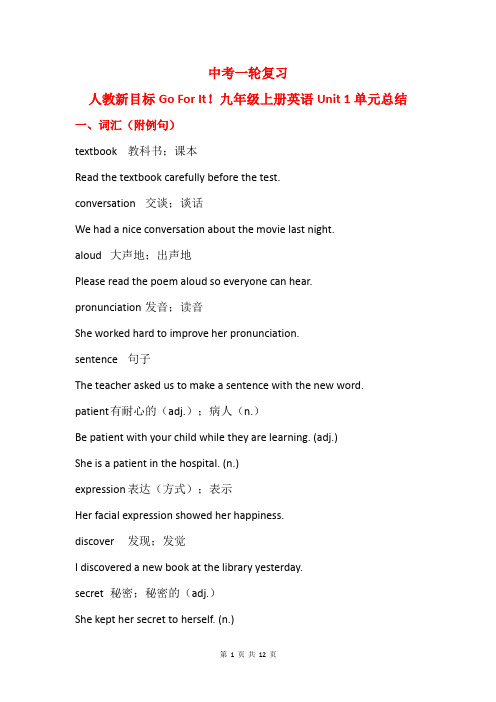
中考一轮复习人教新目标Go For It!九年级上册英语Unit 1单元总结一、词汇(附例句)textbook教科书;课本Read the textbook carefully before the test.conversation交谈;谈话We had a nice conversation about the movie last night.aloud大声地;出声地Please read the poem aloud so everyone can hear.pronunciation发音;读音She worked hard to improve her pronunciation.sentence句子The teacher asked us to make a sentence with the new word. patient有耐心的(adj.);病人(n.)Be patient with your child while they are learning. (adj.)She is a patient in the hospital. (n.)expression表达(方式);表示Her facial expression showed her happiness.discover发现;发觉I discovered a new book at the library yesterday.secret秘密;秘密的(adj.)She kept her secret to herself. (n.)This is a secret room in the house. (adj.)grammar语法I need to brush up on my grammar skills.repeat重复;重做Repeat the steps carefully to avoid mistakes.note笔记;记录(n.);注意;指出(v.)She took notes during the lecture. (n.)Please note that the deadline is next Friday. (v.)pal朋友;伙伴(非正式用语)My best pal and I have been friends since childhood.pattern模式;方式He found a pattern in the data that helped him solve the problem. physics物理学I enjoy studying physics because it's interesting.chemistry化学Chemistry is the study of matter and its interactions.partner搭档;同伴We worked on the project as partners.memorize记住;熟记Memorize these key points for the exam.increase增加;增长The population has increased significantly in recent years.speed速度(n.);加速(v.)She drove at a high speed on the highway. (n.)He sped up the car to pass the slow traffic. (v.)ability能力;才能She has a natural ability for music.brain大脑The brain is the control center of the body.active活跃的;积极的She is an active member of the school club.attention注意;关注Pay attention to the details of the problem.connect连接;与……有联系(v.);连接(n.)Connect the wires correctly to avoid sparks. (v.)The internet allows us to connect with people around the world. (n.) overnight一夜之间;在夜间The project was completed overnight by a team of experts.review回顾;复习She spent the evening reviewing her notes for the test. knowledge知识;学问She has a wealth of knowledge in ancient history.wisely明智地;聪明地He made a wise decision to invest in that company.二、短语知识(附例句)by making word cards 通过制作单词卡片释义:这是一种学习新单词的方法,通过制作卡片来加深记忆。
人教版初三英语各单元知识点总结

初三英语各单元知识点详细总结Unit 1一、知识点1.Check in : 在旅馆的登记入住; Check out: 在旅馆结账离开;2.By: ①通过…..方式途径;例:I learn English by listening to tapes.②在…..旁边;例:by the window/the door③乘坐交通工具例:by bus/car④在……之前,到……为止;例:by October在10月前⑤被例:English is spoken by many people.3.how与what的区别:how通常对方式或程度提问,意思有:怎么样如何,通常用来做状语、表语;what通常对动作的发出者或接受者提问,意思为什么,通常做宾语,主语;①How is your summer holiday It’s OK.how表示程度做表语②How did you travel around the world I travel by air.③What do you learn at school I learn English, math and many other subjects.①What…think of… How…like…②What…do with… How…deal with…③What…like about… How…like…④What’s the weather like today How’s the weather today⑤What to do How to do itwhat I should do with how I should deal with it.What do you like about China =How do you like ChinaI don’t know what to do next step =I don’t know how to do it next step㊣What good / bad weather it is todayweather为不可数名词,其前不能加a㊣What a fine / bad day it is today day为可数名词,其前要加a4. aloud, loud与loudly的用法: 三个词都与"大声"或"响亮"有关;①aloud是副词,重点在出声能让人听见,但声音不一定很大,常用在读书或说话上;通常放在动词之后;aloud没有比较级形式;如: He read the story aloud to his son.他朗读那篇故事给他儿子听;②loud可作形容词或副词;用作副词时,常与speak, talk, laugh等动词连用,多用于比较级,须放在动词之后;如:She told us to speak a little louder. 她让我们说大声一点;③loudly是副词,与loud同义,有时两者可替换使用,但往往含有令人讨厌或打扰别人的意思,可位于动词之前或之后;如:He does not talk loudly or laugh loudly in public. 他不当众大声谈笑;5. voice 指人的嗓音也指鸟鸣;sound 指人可以听到的各种声音;noise 指噪音、吵闹声6. find + 宾语+ 宾补名词形容词介词短语分词等例:I find him friendly. I found him working in the garden.We found him in bed. He found the window closed.We found her honest.7. 常见的系动词有:①是:am 、is、are②保持:keep、stay③转变:become、get、turn④ ……起来feel、look、smell、taste、sound8. get + 宾语+宾补形容词过去分词动词不定式使某种情况发生例:Get the shoes clean. 把鞋擦干净Get Mr. Green to come. 让格林先生进来I want to get my bike repaired. 我想去修自行车You can’t get him waiting. 你不能让他老等着9. 动词不定式做定语①与所修饰的名词构成主谓关系The next train to arrive was from New York. He is always the first to come.②与所修饰的名词构成动宾关系I have nothing to say. I need a pen to write with.I need some paper to write on. I don’t have a room to live in.10. practice , fun 做名词为不可数名词11. add 补充说又说12. join 加入某团体并成为其中一员attend 出席参加会议或讲座join in与take part in指参加到某项活动中去;13.all、both、always以及every复合词与not连用构成部分否定;其完全否定为:all---none, both---neither, everything---nothing, everybody---nobody.14. be afraid of doing sth. / sth.害怕be afraid of being alonebe afraid to do sth.害怕be afraid that恐怕担心,表示委婉语气15.either:①放在否定句末表示“也”②两者中的“任一”③either…or…或者…或者.…引导主语部分,谓语动词按照就近原则16plete完成,是个较正式的词,后不能接动名词finish指日常事物的完成17.a,an 与序数词连用表示“又一”,“再一”;例:Please give me a second apple. There comes a fifth girl.18.have trouble/difficult/problem in doing….. 干…..遇到麻烦,困难19.unless 除非,如果不,等于“if not”本身就表示否定,引导条件状语从句,主句为将来时,条件状语从句用一般现在时表示将来;例:My baby sister doesn’t cry unless she’s hungry.=My baby sister doesn’t cry if she isn’t hungry.Unless you take more care, you’ll have an accident.如果你不多加小心的话,你会出事的;20.instead: adv. 代替,更换;例:We have no coffee, would you like tea instead我们没有咖啡了,改喝茶好吗It will take days by car, so let’s fly ins tead.开车去要好几天呢,咱们还是坐飞机吧;Tom was ill, so I went instead.汤姆病了,所以换了我去;instead of doing sth. 作为某人或某事物的替换例:Let’s play cards instead of watching TV.We sometimes eat rice instead of potatoes.Give me the red one instead of the green one.21.spoken 口头的,口语的;spoken English 口头英语speaking 讲话的,说某种语言的;Speaking skills讲英语的能力22. 提建议的句子:①What/ how about +doing sth. 如:What/ How about going shopping②Why don’t you + do sth. 如:Why don’t you go shopping③Why not + do sth. 如:Why not go shopping④Let’s + do sth. 如:Let’s go shopping⑤Shall we/ I + do sth. 如:Shall we/ I go shopping23. a lot 许多常用于句末如:I eat a lot. 我吃了许多;24. too…to 太…而不能常用的句型too+adj./adv. + to do sth.如:I’m too tired to say anything. 我太累了,什么都不想说;25. not …at all 一点也不根本不如:I like milk very much. I don’t like coffee at all.我非常喜欢牛奶;我一点也不喜欢咖啡;not经常可以和助动词结合在一起,at all 则放在句尾26.be / get excited about sth.=== be / get excited about doing sth.=== be excited to do sth. 对…感兴奋如:I am / get excited about going to Beijing.===I am excited to go to Beijing. 我对去北京感到兴奋;27. ① end up doing sth 终止做某事,结束做某事如:The party ended up singing. 晚会以唱歌而结束;② end up with sth. 以…结束如:The party ended up with her singing. 晚会以她的歌唱而告终;28. first of all 首先. to begin with 一开始later on 后来、随29. also 也、而且用于肯定句常在句子的中间either 也用于否定句常在句末too 也用于肯定句常在句末=as well30. make mistakes 犯错mistake sb. for …把……错认为……make mistakes in doing sth. 在干某事方面出错by mistake 错误地;由于搞错mistake---mistook----mistaken如:I often make mistakes. 我经常犯错;I mistook him for his brother.我错把他认成了他的哥哥;make a mistake 犯一个错误如:I have made a mistake.我已经犯了一个错误;31. laugh at sb. 笑话;取笑某人如:Don’t laugh at me不要取笑我32. take notes 做笔记,做记录33. enjoy doing sth . 喜欢做…乐意做… 如:She enjoys playing football. 她喜欢踢足球;enjoy oneself 过得愉快如:He enjoyed himself. 他过得愉快;34. native speaker 说本族语的人35. one of +the+ 形容词比较级+名词复数形式…其中之一如:She is one of the most popular teachers. 她是最受欢迎的教师之一;36. It’s +形容词+for sb. to do sth. 对于某人来说做某事…如:It’s difficult for me to study English.对于我来说学习英语太难了;句中的it 是形式主语,真正的主语是to study English37. practice doing 练习做某事如:She often practice speaking English. 她经常练习说英语;38. decide to do sth. 决定做某事如:LiLei has decided to go to BeiJing . 李雷已经决定去北京;39. deal with 处理如:I dealt with a lot of problem.40. worry about sb./ sth. 担心某人/ 某事如:Mother worried about his son just now. 妈妈刚才担心他的儿子;41. be angry with sb. 对某人生气如:I was angry with her. 我对她生气;42. perhaps === maybe 也许43. go by 时间过去如:Two years went by. 两年过去了;44. see sb. / sth. doing 看见某人正在做某事强调正在发生see sb. / sth. do 看见某人在做某事如:如:She saw him drawing a picture in the classroom.她看见他正在教室里画画;45. each other 彼此46. regard… as … 把…看作为…. 如:The boys regarded Anna as a fool. 这些男孩把安娜看成傻瓜;47. too many许多修饰可数名词如:too many girlstoo much许多修饰不可数名词如:too much milkmuch too太修饰形容词如:much too beautiful48. change…into…将…变为…如:The magician changed the pen into a book. 这个魔术师将这本书变为一本书;49. with the help of sb. == with one’s help 在某人的帮助下如:with the help of LiLei == with LiLei’s help 在李雷的帮助下50. compare … to …把…与…相比如:Compare you to Anna, you are lucky.你和安娜相比,你是幸运的;二、短语:1.by making flashcards 通过做单词抽认卡2. ask…for help 向某人求助3.read aloud 朗读4.that way =in that way 通过那种方式5.improve my speaking skills 提高我的会话技巧6.for example =for instance例如7.have fun 玩得高兴8.have conversations with friends 与朋友对话9.get excited 高兴,激动10.end up speaking in Chinese 以说汉语结束对话11.do a survey about… 做有关…的调查12.keep an English notebook 记英语笔记13.spoken English = oral English 英语口语14.make mistakes 犯错误15.get the pronunciation right 使发音准确16.practise speaking English 练习说英语17.first of all 首先18.begin with 以…开始ter on随后20.in class在课堂上ught at 嘲笑22.take notes 记笔记23.enjoy doing 喜欢干…24.write down 写下,记下25.look up v + adv 查找,查询26.native speakers 说本族话的人27.make up 编造,虚构,化妆,打扮28.around the world 全世界29.deal with 对待,处理,解决30.worry about be worried about 担心,担忧31.be angry with 生某人的气32.stay angry 生气33.go by 消逝34. regard…as… 把…当做…35plain about/of 抱怨36. change…into… 把…变成… = turn into37.with the help of 在…的帮助下38. compare…to with… 把…和…作比较39.think of think about 想起,想到40.physical problems身体上的问题41.break off 中断,突然终止42. not…at all 根本不,全然不三、句子1.How do you study for a test 你怎样为考试做准备2.I have learned a lot that way. 用那种方法,我已经学到了很多东西;3.It’s too hard to understand the voice. 听懂那些声音太难了;4.Memorizing the words of pop songs also helped a little.记流行歌曲的词也起作用;5. Wei Ming feels differently. 卫明有不同的感受;6.He finds watching movies frustrating. 他觉得看电影让人感到沮丧.7.She added that having conversations with friends was not helpful at all.她又说和朋友对话根本没用;8.I don’t have a partner to practice English with.我没有搭档一起练习英语;ter on, I realized that it doesn’t matter if you don’t understand every word.随后,我认识到听不懂每个词并没有关系;10.It’s amazing how much this helped. 我惊异于这些方法竟如此有用;11.My teacher is very impressed. 给老师留下了深刻的印象;12.She had trouble making complete sentences. 她很难造出完整的句子;13.What do you think you are doing 你在做什么14.Most people speak English as a second language.英语对于大多数人来说是第二语言;15.How do we deal with our problem 我们怎样处理我们的问题16.It is our duty to try our best to deal with each challenge in our education with the help of our teachers. 在老师的帮助下尽我们最大的努力来应对挑战是我们的责任;He can’t walk or even speak.他无法走路,甚至无法说话Unit 2一、知识点1. used to 过去常常做某事,暗指现在已经不存在的动作或状态. 后跟动词原形. used to do sth.There used to be ….反意疑问句didn’t there否定形式为: didn’t use to 或usedn’t to疑问形式为: Did…use to… 或Used…to…be/get used to doing sth.习惯于, to 为介词.2. wear 表示状态. =be in +颜色的词put on 表示动作.dress + 人给某人穿衣服.dress sb. / oneselfhave on表示状态不用于进行时态3. on the swim team on 是…的成员,在…供职.4. Don’t you remember me 否定疑问句.考点Yes, I do. 不, 我记得. No, I don’t 是的, 我不记得了.5. 反意疑问句:①陈述部分的主语为this, that, 疑问部分主语用it; 陈述部分主语用these, those, 疑问部分用they 做主语.例: This is a ne w story, isn’t itThose are your parents, aren’t they②陈述部分是there be 结构, 疑问部分仍用there例: There was a man named Paul, wasn’t there③ I am 后的疑问句, 用aren’t I例: I am in Class 2, aren’t I④陈述部分与含有not, no, never, few, little, hardly, seldom, neither, none 等词时,疑问部分用肯定.例: Few people liked this movie, didn’t they但陈述句中若带有否定前缀或后缀的单词时, 这个句子仍视为肯定, 后面仍用否定.例: Your sister is unhappy, isn’t she⑤陈述部分的主语若为不定式或V-ing 短语, 疑问部分主语用it.例: To spend so much money on clothes is unnecessary, isn’t it⑥陈述句中主语是nobody, no one, everyone, everybody 等指人的不定代词时,疑问部分用they做主语;若陈述部分主语是something, anything, noting, everything 等指事物的不定代词时, 疑问部分用it 做主语.例: Nobody says one word about the accident, do theyEverything seems perfect, doesn’t it⑦当主语是第一人称I时, 若谓动为think, believe, guess 等词时, 且其后跟宾丛,这时疑问句部分的人称,时态要与宾语从句保持一致, 同时还要考虑否定转移.例: I don’t think he can finish the work in time, can he⑧前面是祈使句, 后用will you let’s 开头时, 后用shall we6. be terrified of 害怕的程度比be afraid of 深.7. miss: ①思念, 想念例: I really miss the old days.②错过, 未中, 未赶上, 未找到.例: It’s a pity that you miss the bus.The boy shot at the goal, but missed.8. no more 用在句中=not…any more 用在句尾指次数;no longer 用在句中=not…any longer 用在句尾指时间.9. right: ① adj. 正确的, 右边的② n. 右方, 权利③ adv. 直接地.10. It seems that Yu Mei has changed a lot. = Y u Mei seems to have changed a lot.11. afford + n. /pron. afford + to do 常与can, be able to 连用.例: Can you afford a new carThe film couldn’t afford to pay such large salaries.12. as well as 连词, 不但…而且… 强调前者. 若引导主语, 谓动与前者在人称和数上一致例: Living things need air and light as well as water.生命不仅需要水, 还需要空气和阳光.I as well as they am ready to help you.不仅是他们, 我也愿意帮助你.13. alone = by oneself 独自一人. lonely 孤独的, 寂寞的.14. in the last/past + 一段时间during the last/past + 一段时间与现在完成时连用.15. die v. dead adj. death n. dying 垂死的16. play the piano弹钢琴17. ①be/ become interested in sth. 对…感兴趣②be interested in doing sth. 对做…感兴趣③show great interest in 在……方面产生极大的兴趣④a place of interest 一处名胜some places of interest如:He is intere sted in math, but he isn’t interested in speakingEnglish. 他对数学感兴趣,但是他对说英语不感兴趣;⑤ interested adj. 感兴趣的,指人对某事物感兴趣,往往主语是人⑥ interesting adj.有趣的,指某事物/某人具有趣味,主语往往是物⑦ an interesting book / man18. 害怕… be terrified of sth. 如:I am terrified of the dog.be terrified of doing sth. 如:I am terrified of speaking.19. on 副词,表示电灯、电视、机械等在运转中/打开,其反义词off. with the light on 灯开着20. walk to somewhere 步行到某处walk to school 步行到学校21.spend 动词,表示“花费金钱、时间”①spend…on sth. 在某事上花费金钱、时间②spend…doing sth.花费金钱、时间去做某事如:He spends too much time on clothes. 他花费太多的时间在衣着He spend 3 months building the bridge.他花费了三个月去建这座桥;pay for 花费如:I pay 10 yuan for the book. 我花了10元买这本书;take动词有“花费”的意思常用的结构有:It takes sb. … to do sth. 如:It takes me a day to read the book.22. chat with sb. 与某人闲聊如:I like to chat with him.我喜欢和他聊天;23. worry about sb./ sth. 担心某人/某事worry 是动词be worried about sb./sth. 担心某人/某事worried 是形容词如:Don’t worry about him. 不用担心他;Mother is worried about her son. 妈妈担心他的儿子;24. all the time 一直、始终25. take sb. to + 地方送/带某人去某个地方如:A person took him to the hospital. 一个人把他送到了医院;Lui took me home. 刘把我送回了家;home 的前面不能用to26. hardly adv. 几乎不、没有hard 困难的;猛烈地hardly ever 很少hardly 修饰动词时,通常放在助动词、情态动词之后,实义动词之前助动词/情态动词+hardlyhardly + 实义动词如:I can hardly understand them. 我几乎不能够明白他们;I hardly have time to do it. 我几乎没有时间去做了;It rains hard outside, I could hardly go out.27. in the last few years. 在过去的几年内常与完成时连用如:I have lived in China in the last few years. 在过去的几年内我在中国住;28. be different from 与…不同29. how to swim 怎样游泳不定式与疑问词连用:动词不定式可以和what, which, how, where, when 等引导的疑问句连用,构成不定工短语;如:The question is when to start. 问题是什么时候开始;I don’t know where to go. 我不知道去哪;30. make sb./ sth. + 形容词make you happymake sb./ sth. + 动词原形make him laugh31. move to +地方搬到某地如:I moved to Beijing last year.32.It seems that +从句看起来好像……如:It seems that he has changed a lot. 看起来他好像变了许多;33. help sb. with sth. 帮某人某事help sb. to do sth. 帮某人做某事She helped me with English.她帮助我学英语;She helped me to study English;她帮助我学习英语;34. fifteen-year-old 作形容词15岁的fifteen-year-olds 作名词指15岁的人fifteen years old 指年龄15岁如:a fifteen-year-old boy一个15岁的男孩Fifteen-year-olds like to sing. 15岁的人喜欢唱歌;I am fifteen years old . 我是15岁;35.支付不起… can’t /couldn’t afford to do sth.can’t / couldn’t afford sth.如:I can’t/couldn’t afford to buy the car.I can’t/couldn’t afford the car. 我买不起这个辆小车;36. as + 形容词./副词+as sb. could/can 尽某人的…能力如:Zhou run as fast as her could/can. 她尽她最快的能力去跑;37. get into trouble with 遇到麻烦38. in the end 最后39. make a decision 下决定下决心40. to one’s surprise 令某人惊讶如:to their surprise令他们惊讶to Li Lei’s surprise令李雷惊讶41. take pride in sth. 以…而自豪如:His father always take pride in him. 他的爸爸总是以他而自豪42. pay attention to sth. 对…注意,留心如:You must pay attention to your friend. 你应该多注意你的朋友;43. be able to do sth. 能做某事如:She is able to do it. 她能够做到;44. give up doing sth. 放弃做某事如:My father has given up smoking. 我爸爸已经放弃吸烟了;复合句与简单句的转化:①when ------ at the age of …②so…that…----- too… to…. / enough to …③so that…------ in order to do sth.④because…----- because of…⑤if ….----- without / with…⑥if…----- 祈使句+ and / or + 简单句⑦宾语从句----特殊疑问词+动词不定式⑧be afraidbe sure that +从句---- 动词不定式be sorry⑨It seems / seemed that sb….------ sb. seems / seemed to do sth.⑩Sb. hopes / hoped that ….-------sb. hopes / hoped to do sth.二、短语1. be more interested in 对…更感兴趣.2. on the swim team 游泳队的队员.3. be terrified of 害怕.4. gym class 体操课.5. worry about. 担心.6. all the time 一直, 总是7. chat with 与…闲聊8. hardly ever 几乎从不9. walk to school = go to school on foottake the bus to school = go to school by bus10. as well as 不仅…而且11. get into trouble 遇到麻烦12. make a decision 做出决定13. to one’s surprise 使某人吃惊的是14. take pride in 为…感到骄傲15. pay attention to 留心, 注意16. consist of 由…组成/构成. be made up of 由…组成/构成.17. instead of 代替, 而不是18. in the end 最后, 终于19. play the piano 弹钢琴三、句子1.I used to be afraid of the dark. 我以前害怕黑暗.2.I go to sleep with my bedroom light on. 我开着卧室的灯睡觉.3.I used to spend a lot of time playing games with my friends. 以前我常常花很多时间和我的朋友们玩游戏.4.I hardly ever have time for concerts. 我几乎没有时间去听音乐会.5.My life has changed a lot in the last few years.6.It will make you stressed out. 那会使你紧张的.7.It seems that Yu Mei has changed a lot. 玉梅似乎变化很大.Unit 3一、知识点①英语有两种语态:主动语态和补动语态主动语态表示是动作的执行者被动语态表示主语是动作的承受者Cats eat fish. 主动语态猫吃鱼;Fish is eaten by cats.被动语态鱼被猫吃;②被动语态的构成由“助动词be +及物动词的过去分词”构成助动词be 有人称、数和时态的变化,其变化规则与be 作为连系动词时完全一样;时态被动语态结构例句一般现在时amare +过去分词isEnglish is spoken inmany countries.一般过去时was +过去分词were + 过去分词This bridge was built in1989.情态动词can/shouldmay +be+过去分词must/……The work must be doneright now.③被动语态的用法当我们不知道谁是动作的执行者,或者没有必要指出谁是动作的执行者,或者只需强调动作的承受者时,要用被动语态;2. allow sb. to do sth. 允许某人做某事主动语态如:Mother allows me to watch TV every night. 妈妈允许我每晚看电视;be allowed to do sth. 被允许做某事被动语态如:LiLy is allowed to go to Qinzhou. 莉莉被允许去钦州;3. get their ears pierced 穿耳洞让/使别人做某事get sth. done过去分词have sth. done 如:I get my car repaired. == I have my car repaired. 我让别人修好我的车I want to have my hair cut. 我要理发.4. enough 足够形容词+enough 如:beautiful enough足够漂亮enough+名词如:enough food 足够食物enough to 足够…去做…如:I have enough money to go to Beijing. 我有足够的钱去北京;She is old enough to go to school.她够大去读书了;5. stop doing sth. 停止做某事Please stop speaking.请停止说话;stop to do sth. 停止下来去做某事Please stop to speak. 请停下来说话;6. 看起来好像…sb. s eem to do sth. = It seems that +从句He seems to feel very sad.It seems that he feels very sad. 他看起来好像很伤心;7.倒装句:由so+助动词be/do/will/have/情态动词+主语意为:…也是一样Neither/Nor + be动词/助动词/情态动词+主语前为否定表示与前面所述事实一致.She is a student. So am I.她是一个学生,我也是;She went to school just now. So did I . 她刚才去学校了,我也是She has finished the work. So have I . 她已经完成了工作,我也完成了;She will go to school. So will he.她将去学校,他也是;Tom can’t swim. Neither can John.8. yet 仍然,还常用在否定句或疑问句当中可与although/though连用9. stay up 熬夜如:I often stay up until 12:00pm.我经常熬夜到12点;10. clean up 打扫整理如:I have cleaned up the bedroom. 我已经打扫完了卧室;11. 程度副词:always总是usually经常sometimes有时never从不如:I am always/usually/sometimes/never late for school.我总是/经常/有时/从不上学迟到;12. 曾经做某事:Do you eve r get to school late Yes, I do. No, I don’t.Have you ever got to school late Yes, I have. No, I haven’t.13. go shopping去购物, go fishing去钓鱼go swimming去游泳, go boating去划船go hiking去登山, go trekking去徒步14. .be strict with+人. be strict in+事物.例: The head teacher is strict with his studentsHe is strict in the work.15. take the test 参加考试pass the test 通过考试fail a test 考试失败16. the other day前几天,不久前的一天.用于过去时every other day = every two days 每隔一天每两天17. agree 同意反义词disagree不同意动词agreement 同意反义词disagreement 不同意名词18. keep sb/ sth. +形容词使某人/某物保持….如:We should keep our city clean.cleaningⅹ我们应该保持我们的城市干净;Don’t keep me waiting for a long time.别让我等得太久;19. both…and…+动词复数形式如:Both Jim and Li Ming play basketball.20. learn sth. from sb. 向谁学习什么如:Jim learnt English from his English teacher. 吉姆向他的英语老师学习英语21. have an opportunity to do sth. 有机会做某事have a chance of doing sth. 有机会做某事如:I have an opportunity to go to Beijing. I have a chance of going to Beijing.22. at present 目前23. at least 最少at most 最多24. 花费take ,cost, spend , payIt take sb. time to do sth. It took me 10days to read the book.sth. cost sb. …… The book cost me 100yuan.sb. spend … on sth. She spent 10day s on this book.sb. spend …doing sth. She spent 10days reading this book.sb. pay … for sth. She paid 10yuan for this book.25. have +时间段+off 放假,休息如:have 2 days offoff 不工作,不上班,不上学,不值班.例: I think I’ll take the afternoon off. 我想下午歇班.She is off today. 她今天休息.I have three days off next week. 下周我有三天假.They haven’t had a day off since last week. 从上周来,他们没休息过一天.26. reply to 答复某人如:She replayed to MrGreen.27. agree with sth. 同意某事如:I agree with that idea.agree to sb. 同意某人的意见如:I agree to LiLei.28. get in the way of 碍事,妨碍如:Her social life got in the way of her studies. 她的社会生活妨碍了她的学习;29. success n. succeed v. successful adj. successfully adv.30. think about 与think of 的区别①当两者译为:认为、想起、记着时,两者可互用I often think about/ of that day. 我经常想起那天;②think about 还有“考虑”之意,think of 想到、想出时两者不能互用At last, he thought of a good idea. 最后他想出了一个好主意;We are thinking about going Qinzhou. 我们正在考虑去钦州;31. 对… 热衷, 对…兴趣be serious about doing 如:She is serious about dancing. 她对跳舞热衷;be serious about sth. 如:She is serious about him. 她对他感兴趣;32. practice doing 练习做某事She often practice speaking English.33. care about sb. 关心某人如:Mother often care about her son.34. also 也用于句中either也用于否定句且用于句末too=as well 也用于肯定句且用于句末I am also a student. 我也是一个学生I am a student too. 我也是一个学生;I am not a student either. 我也不是一个学生;35.allow sb to do sth 允许某人做… allow doing sth 允许做…36.stupid silly foolish 三个词都有“蠢”的意思.但略有不同.stupid 程度最强,指智力理解力学习能力差. silly 指头脑简单,傻头傻脑,使人觉得可笑,带有感情色彩. foolish 尤其在口语中广泛使用.例: He is stupid in learning math. 他学习数学很笨.Stop asking such silly questions. 别再问这样傻的问题了.You are foolish to throw away such a good chance.你真蠢,丢掉这样一个好机会.37.He doesn’t seem to have many fri ends.=It seems that he doesn’t have many friends.=He seems not to have many friends.38.clean v. 打扫,清理clean up 比较彻底地打扫,清理clean out 打扫,清理地最彻底.39.concentrate on… 全神贯注做…例: He decided to concentrate on physics because he failed the exam.This company concentrates on China market.这家公司把重点放在中国市场上.40. more…than…①与其说…不如说…; 比…更…例: The man is more stupid than nervous.与其说那人紧张,倒不如说他愚蠢.②在这一结构中,more做adj. 修饰名词,表示“比…多”例:I have more books than you. 我的书比你的多.41.volunteer ① n. 自愿者. ② v. volunteer to do sth. 自愿做…例: We all volunteered to help in the old people’s home.我们都志愿到敬老院帮忙.42. get in the way of... 妨碍...例: He never gets in others’ way. 他从不妨碍别人.The bikes over there will get in the way of others. 自行车放在那里会妨碍别人的.43. success n. successful adj. succeed v.44. only 处于句首,并后跟状语时,全句需要倒装.例: Only then did he understand it. 只有到那时,他才明白.Only in this way can we learn English well. 只有这样我们才能把英语学好.Only when she came home, did he learn the news. 当她到家时,他才得知了这消息.45. care about 关心,在乎,在意.例: No one cares about others nowadays. 现在没人关心别人.I don’t care about what he does. 我并不在意他干什么.二、短语1. be allowed to do sth 被允许干…allow sb to do sth 允许某人干…allow doing sth 允许干…2. sixteen-year-olds = sixteen-year-old boys and girls 16岁的孩子3. part-time jobs 兼职工作4. a driver’s license 驾照5. on weekends 在周末6. at that age 在那个年龄段7. on school nights 在上学期间的每个晚上8. stay up 熬夜9. clean up 相当与及物动词清扫10. fail in a test 考试不及格11. take the test 参加考试12. the other day 前几天13. all my classmates 我所有的同学14. concentrate on 全神贯注于15. be good for 对…有益16. in groups 成群的,按组的17. get noisy 吵闹系表结构18. learn from 向某人学习19. at present 目前,现在20. have an opportunity to do sth 有做…的机会21.English-English dictionary 英英词典22. at least 至少23.eight hours’ sleep a night 每晚8小时的睡眠24. an old people’s home 敬老院25. take time to do sth 花费时间干…26. primary schools 小学27. have…off 放假,休息28. reply to 回答,答复29. get in the way of 妨碍30. a professional athlete 职业运动员31. achieve one’s dreams 实现梦想32. think about 思考,考虑33. in the end 最后,终于34. be serious about 对…热忠/极感兴趣35. spend…on + n. spend …in + v-ing 在…上花费时间/金钱36. care about 关心,担心,在乎37. agree with 同意…三.句子1. I don’t think twelve-year-olds should be allowed to get their ears pierced.我认为不应该允许12岁的孩子穿耳孔.2.They talk instead of doing homework. 他们聊天而不是做作业.3.He is allowed to stay up until 11:00 pm. 允许他们熬到晚上11点.4.We should be allowed to take time to do things like that more often.我们应该被允许更加经常的花些时间多做这类事情.5.What school rules do you think should be changed你认为学校的哪些制度应该改一改了6.The two pairs of jeans both look good on me.这两条牛仔裤穿在我身上都适合.7.The classroom is a real mess. 教室太脏了.8.Should I be allowed to make my own decisions9.Only then will I have a chance of achieving my dream.只有这样我才能实现我的梦想.10.They should be allowed to practice their hobbies as much as they want.应该允许他们对业余爱好想练多长时间就练多长时间.11.We have nothing against running. 我们没有理由反对他跑步.Unit 4一、知识点1. if 引导的非真实性条件状语从句即虚拟语气通过动词形式的变化来表示说话人对发生的动作或存在的状态所持的态度或看法的动词形式称为语气,虚拟语气表示说话人所说的。
(完整版)人教版九年级全一册英语知识点归纳.docx

PEP 九年英知点Unit 1 How can we become good learners?重点: 1.学并掌握用how 来做某事的方式; 2.学并掌握by+ving 来表达做某事的方法。
点:名在句中充当的成分。
知点:ask for help 求帮助work with sb. 和⋯⋯一起工作have conversation with 和⋯⋯一起main idea 中心思想the secret to ⋯⋯的秘word by word 逐字take time 花word groupbody language 肢体言expressions on faces上的表情key words 关as well 也look up 看take notes 笔practice doing sth. 做某事pen pal 笔友keep a diary 日make mistakes 犯increase 增加;提高decrease 减少;降低practice with sb. 和⋯⋯一起depend on 依whether or not 是否pay attention to sth. / doing sth. 注意某事 /做某事for a long time 很一段connect ⋯ with ⋯把⋯⋯和⋯⋯接起来write down 写下mind map 思lifelong journey 身的旅程on one ’ s own独自地bit by bit 一点点at once 上,立刻It ’ s a piece of cake小.菜一碟。
It serves you right. 你活。
Use it or lose it.Practice makes perfect.Unit 2 I think that mooncakes are delicious!重点 & 点: 1. that, if whether 引的从句; 2. 感句的学和运用。
人教版初中英语九年级全册各单元知识点、语法归纳整理
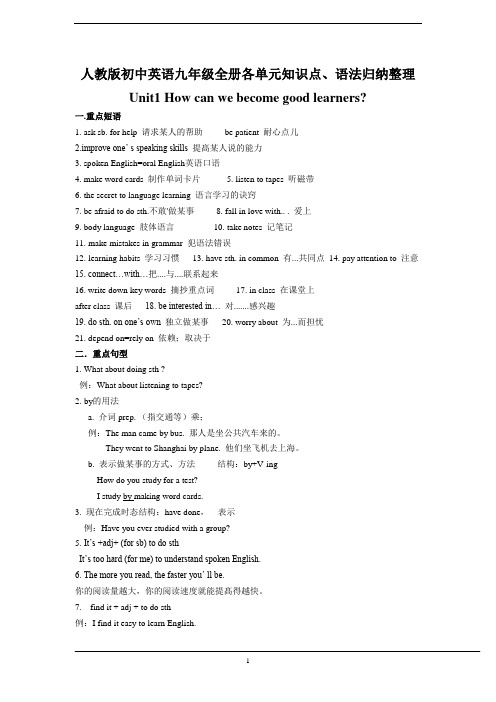
人教版初中英语九年级全册各单元知识点、语法归纳整理Unit1 How can we become good learners?一.重点短语1. ask sb. for help 请求某人的帮助be patient 耐心点儿2.improve one’ s speaking skills 提髙某人说的能力3. spoken English=oral English英语口语4. make word cards 制作单词卡片5. listen to tapes 听磁带6. the secret to language learning 语言学习的诀窍7. be afraid to do sth.不敢'做某事8. fall in love with.. . 爱上9. body language 肢体语言10. take notes 记笔记11.make mistakes in grammar 犯语法错误12.learning habits 学习习惯13. have sth. in common 有...共同点14. pay attention to 注意15. connect…with…把....与....联系起来16. write down key words 摘抄重点词17. in class 在课堂上after class 课后18. be interested in… 对.......感兴趣19. do sth. on one’s own 独立做某事20. worry about 为...而担忧21. depend on=rely on 依赖;取决于二.重点句型1. What about doing sth ?例:What about listening to tapes?2.by的用法a. 介词 prep. (指交通等)乘;例:The man came by bus. 那人是坐公共汽车来的。
人教版九年级英语全册知识点归纳
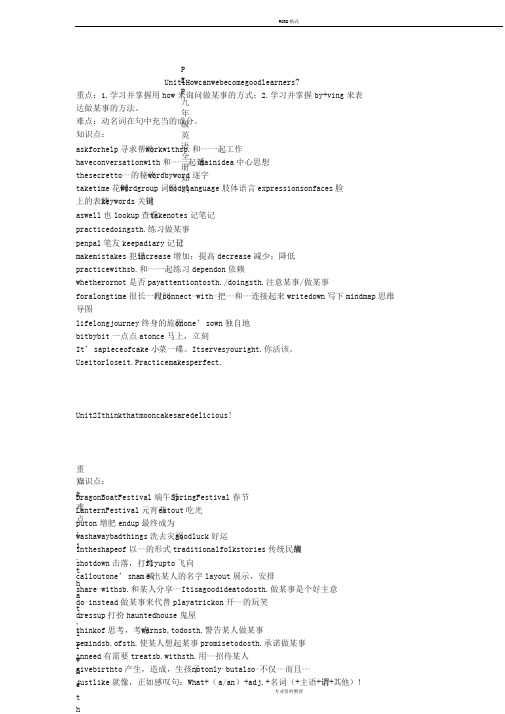
P E P 九年级英语全册知纳 Unit1Howcanwebecomegoodlearners? 重点:1.学习并掌握用how 来询问做某事的方式;2.学习并掌握by+ving 来表 达做某事的方法。
难点:动名词在句中充当的成分。
知识点: askforhelp 寻求帮助w orkwithsb.和⋯⋯一起工作 haveconversationwith 和⋯⋯一起对话mainidea 中心思想thesecretto ⋯⋯的秘诀w ordbyword 逐字 taketime 花时间w ordgroup 词组b odylanguage 肢体语言expressionsonfaces 脸上的表情k eywords 关键词aswell 也lookup 查看t akenotes 记笔记 practicedoingsth.练习做某事 penpal 笔友keepadiary 记日记makemistakes 犯错i ncrease 增加;提高decrease 减少;降低 practicewithsb.和⋯⋯一起练习dependon 依赖whetherornot 是否payattentiontosth./doingsth.注意某事/做某事foralongtime 很长一段时间c onnect ⋯with ⋯把⋯⋯和⋯⋯连接起来writedown 写下mindmap 思维导图lifelongjourney 终身的旅程o none ’sown 独自地 bitbybit 一点点atonce 马上,立刻It ’sapieceofcake 小.菜一碟。
Itservesyouright.你活该。
Useitorloseit.Practicemakesperfect.Unit2Ithinkthatmooncakesaredelicious!重点&难点:1.that,if知识点:DragonBoatFestival 端午节S pringFestival 春节 LanternFestival 元宵节e atout 吃光 puton 增肥endup 最终成为 washawaybadthings 洗去灾祸g oodluck 好运intheshapeof 以⋯⋯的形式traditionalfolkstories 传统民间故事 shotdown 击落,打垮f lyupto 飞向 calloutone ’snam 喊e 出某人的名字layout 展示,安排 share ⋯withsb.和某人分享⋯⋯Itisagoodideatodosth.做某事是个好主意 do ⋯instead 做某事来代替playatrickon 开⋯⋯的玩笑 dressup 打扮hauntedhouse 鬼屋 thinkof 思考,考虑w arnsb,todosth.警告某人做某事 remindsb.ofsth.使某人想起某事promisetodosth.承诺做某事1Unit3Couldyoupleasetellmewheretherestroomare?重点:学习并掌握wh-&how 所引导的宾语从句。
人教版九年级全一册各单元的重点短语及语法知识点汇总
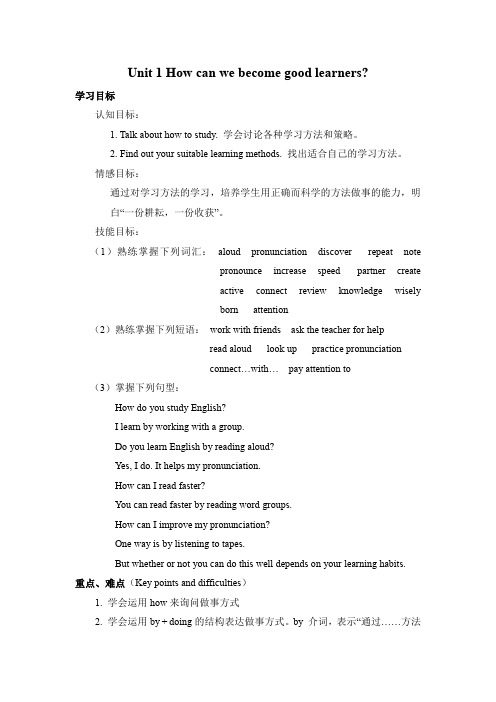
Unit 1 How can we become good learners?学习目标认知目标:1. Talk about how to study. 学会讨论各种学习方法和策略。
2. Find out your suitable learning methods. 找出适合自己的学习方法。
情感目标:通过对学习方法的学习,培养学生用正确而科学的方法做事的能力,明白“一份耕耘,一份收获”。
技能目标:(1)熟练掌握下列词汇:aloud pronunciation discover repeat notepronounce increase speed partner createactive connect review knowledge wiselyborn attention(2)熟练掌握下列短语:work with friends ask the teacher for helpread aloud look up practice pronunciationconnect…with… pay attention to (3)掌握下列句型:How do you study English?I learn by working with a group.Do you learn English by reading aloud?Yes, I do. It helps my pronunciation.How can I read faster?You can read faster by reading word groups.How can I improve my pronunciation?One way is by listening to tapes.But whether or not you can do this well depends on your learning habits.重点、难点(Key points and difficulties)1. 学会运用how来询问做事方式2. 学会运用by + doing的结构表达做事方式。
人教版九年级全一册英语Unit14单元语法知识点总结

人教版九年级全一册英语Unit14单元语法知识点总结本单元重点短语的具体用法1. win a prize:获奖。
例如:She won a prize for her excellent performance.(她因出色的表现获奖。
)2. do a school survey:做一个学校调查。
例如:We need to doa school survey to find out students' opinions.(我们需要做一个学校调查来了解学生的意见。
)3. meet the standard of a strict teacher:满足一位要求严格的老师的要求。
例如:To meet the standard of a strict teacher, you need to work hard.(为了满足严格老师的要求,你需要努力学习。
)4. meet this group of friends:遇到这群朋友。
例如:I'm glad to meet this group of friends, they bring me a lot of joy.(我很高兴遇到这群朋友,他们给我带来了很多快乐。
)5. score two goals in a row:连续踢进两个球。
例如:He was able to score two goals in a row during the soccer game.(他在足球比赛中连续踢进了两个球。
)6. learn to play the keyboard:学会弹钢琴。
例如:My goal is to learn to play the keyboard this year.(我的目标是今年学会弹钢琴。
)7. be patient with sb:对……有耐心。
例如:You should be patient with your little sister.(你应该对你的妹妹有耐心。
- 1、下载文档前请自行甄别文档内容的完整性,平台不提供额外的编辑、内容补充、找答案等附加服务。
- 2、"仅部分预览"的文档,不可在线预览部分如存在完整性等问题,可反馈申请退款(可完整预览的文档不适用该条件!)。
- 3、如文档侵犯您的权益,请联系客服反馈,我们会尽快为您处理(人工客服工作时间:9:00-18:30)。
九年级英语Unit11. by + doing通过……方式如:by studying with a groupby 还可以表示:“在…旁”、“靠近”、“在…期间”、“用、”“经过”、“乘……”等如:I live by the river. I have to go back by ten o’clock.The thief entered the room by the window. The student went to park by bus.2. talk about 谈论,议论,讨论如:The students often talk about movie after class. 学生们常常在课后讨论电影。
talk to sb. === talk with sb. 与某人说话talk to sb. about sth 与某人谈论某事3. 提建议的句子:①What/ how about +doing sth.?如:What/ How about going shopping?②Why don’t you + do sth.?如:Why don’t you go shopping?③Why not + do sth. ? 如:Why not go shopping?④Let’s + do sth. 如:Let’s go shopping⑤Shall we/ I + do sth.?如:Shall we/ I go shopping?4. a lot 许多= much 常用于句末如:I eat a lot. 我吃了许多。
5. too…to 太…而不能常用的句型too + adj./adv. + to do sth.如:I’m too tired to say anything. 我太累了,什么都不想说。
so adj./adv. that 主语+ can’t v.I am so tired that I can’t say anything.6. aloud, loud与loudly的用法三个词都与"大声"或"响亮"有关。
①aloud是副词,重点在出声能让人听见,但声音不一定很大,常用在读书或说话上。
read/speak aloud通常放在动词之后。
aloud没有比较级形式。
如: He read the story aloud to his son.他朗读那篇故事给他儿子听。
②loud可作形容词或副词。
用作副词时,常与speak, talk,laugh等动词连用,多用于比较级,须放在动词之后。
如:She told us to speak a little louder. 她让我们说大声一点。
③loudly是副词,与loud同义,有时两者可替换使用,但往往含有令人讨厌或打扰别人的意思,可位于动词之前或之后。
如: He does not talk loudly or laugh loudly in public. 他不当众大声谈笑。
7. not v. / adj. at all 一点也不, 根本不= not v./ adj. in the slightest 如:I like milk very much. I do n’t like coffee at all. /I don’t like coffee in the slightest.我非常喜欢牛奶。
我一点也不喜欢咖啡。
not经常可以和助动词结合在一起,at all 则放在句尾8. be / get excited about sth.=== be / get excited about doing sth.=== be excited to do sth. 对…感兴奋如:I am / get excited about going to Beijing.I am excited to go to Beijing. 我对去北京感到兴奋。
9. ①end up doing sth 终止做某事,结束做某事如:The party ended up singing. 晚会以唱歌而结束。
②end up with sth. 以…结束如:The party ended up with her singing. 晚会以她的歌唱而告终。
首先at the beginning; to start with;. 一开始后来、随也、而且(用于肯定句)常在句子的中间也(用于否定句)常在句末(用于肯定句) 常在句末在……方面犯错如:I often make mistakes. 我经常犯错。
犯一个错误如:I have made a mistake. 我已经犯了一个错误。
by mistake 错误地13. laugh at sb. 笑话;取笑(某人)如:Don’t laugh at me!不要取笑我!14. take notes 做笔记,做记录(in one’s notebook)15. enjoy doing sth .喜欢做…乐意做…She enjoys playing football.她喜欢踢足球。
enjoy oneself 过得愉快如:He enjoyed himself. 他过得愉快。
16. native speaker 说本族语的人17. make up 组成、构成18. one of +(the+ 形容词最高级)+名词复数形式…其中之一如:She is one of the most popular teachers. 她是最受欢迎的教师之一。
19. It’s +形容词+(for sb. ) to do sth. (对于某人来说)做某事…如:It’s difficult (for me ) to study English. 对于我来说学习英语太难了。
句中的it 是形式主语,真正的主语是to study English20. practice doing 练习做某事如:She often practice speaking English. 她经常练习说英语。
21. decide to do sth. 决定做某事如:decide not to v.Li Lei has decided to go to Beijing . 李雷已经决定去北京。
22. unless 假如不,除非引导条件状语从句= if … notYou will fail unless you work hard../if you don’t work hard.假如你不努力你会失败。
I won’t write unless he writes first./ if he doesn’t write first.除非他先写要不我不写23. deal with 处理= do with如:I dealt with a lot of problem.How to deal with …?= What to do with …? 如何处理……?24. worry about sb./ sth. 担心某人/ 某事be worried about …=be anxious aboutworri ed about sb./sth. = was/were worried about sb./sth.如:Mother worried about his son just now. 妈妈刚才担心他的儿子。
25. be angry with sb. 对某人生气=be mad at如:I was angry with her. 我对她生气。
26. perhaps === maybe 也许= possibly27. go by (时间) 过去如:Two years went by. 两年过去了。
As time goes by,…28. see sb. / sth. doing看见某人正在做某事强调正在发生sb. be seen doingsee sb. / sth. do看见某人在做某事sb. be seen to do如:She saw him drawing a picture in the classroom.她看见他正在教室里画画。
29. each other 彼此30. regard … as … 把…看作为…. 如:The boys regarded Anna as a fool. 这些男孩把安娜看成傻瓜。
31.too many许多 修饰可数名词 如:too many girlstoo much 许多 修饰不可数名词 如:too much milk much too 太 修饰形容词 如:much too beautiful 32. change … into … 将…变为…如:The magician changed the pen into a book. 这个魔术师将这本书变为一本书。
33. with the help of sb. == with one ’s help 在某人的帮助下如:with the help of LiLei == with LiLei’s help 在李雷的帮助下 34. compare … to … 把…与…相比如:Compare you to Anna, you are lucky.你和安娜相比,你是幸运的。
不做的m going to Shanghai instead. 去年夏天我去北京, 今年我将要去上海。
I will go instead of you. 我将代替你去。
He stayed at home instead of going swimming. 他呆在家里而不是去游泳。
九年级英语Unit21. used to do sth. 过去常常做某事否定形式: didn ’t use to do sth. / used not to do sth.He didn ’t use to smoke. 他过去不吸烟。
如:He used to play football after school. 放学后他过去常常踢足球。
疑问形式:Used sb. to v. ? = Did sb. use to v.? Yes, sb. used. / No, sb. use dn’t.Did he use to play football? Yes, I did. No, I didn ’t.There used to be + 主语 介词地点。
“在……曾有……。
” 2. 反意疑问句①肯定陈述句+否定提问 如:Lily is a student, isn ’t she? Lily will go to China, won ’t she? ②否定陈述句+肯定提问 如:She doesn ’t come from China, does she? You haven’t finished homework, have you?③提问部分用代词而不用名词 Lily is a student, isn ’t she?④陈述句中含有否定意义的词,如:little, few, never, nothing, hardly 等。
